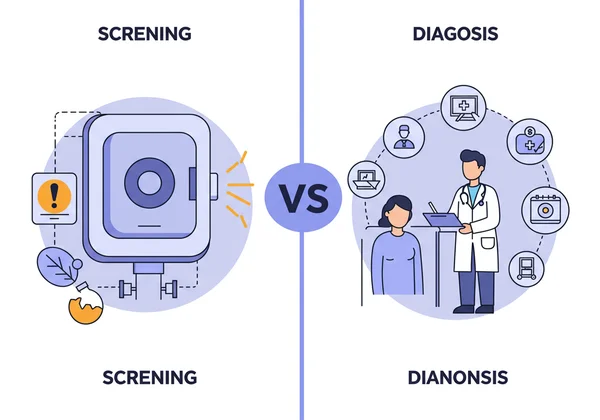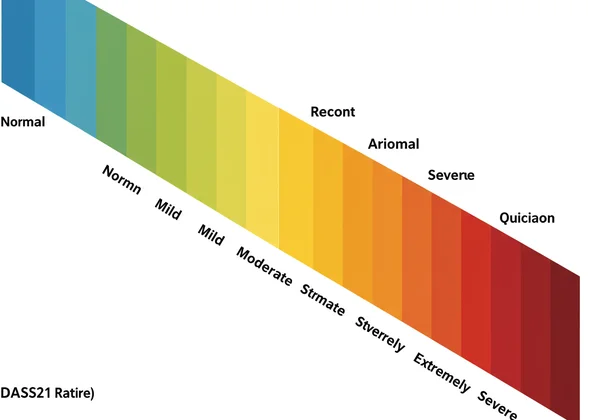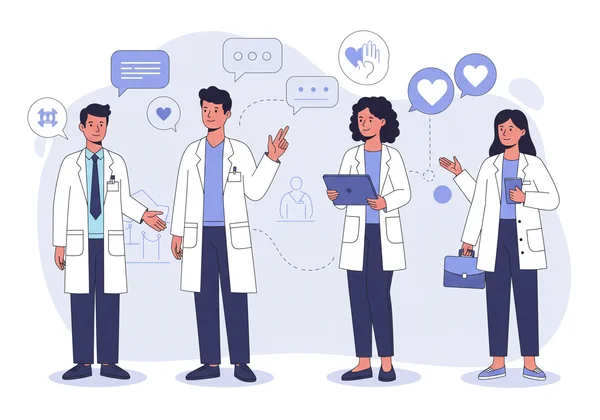DASS21: Screening Tool, Not Diagnosis. When to Seek Help
August 10, 2025 | By Evelyn Reed
Taking a step to understand your emotional state is a powerful act of self-care. If you’ve recently completed the Depression, Anxiety and Stress Scale (DASS21), you now have a snapshot of your feelings over the past week. But a common and crucial question arises: What do my DASS21 results really mean? The answer is vital for using this tool responsibly. The DASS21 is an incredible instrument for raising self-awareness, but it is not a final verdict on your mental health.
This guide will walk you through the difference between a screening and a diagnosis, help you understand what your scores indicate, and clarify when it’s time to seek professional guidance. This knowledge empowers you to use your results as they were intended: as a valuable starting point on your journey to well-being. If you haven't yet, you can start your self-assessment anytime.
Understanding the DASS21: A Screening Tool's Purpose
To truly benefit from the DASS21, we must first understand its specific role. This tool is designed to be an accessible, preliminary check-in, much like taking your temperature when you feel unwell. It provides a quick reading of your emotional climate, highlighting areas that might need more attention.
What is the DASS21 Self-Assessment?
The dass21 self-assessment is a scientifically validated questionnaire composed of 21 questions. It efficiently measures the severity of a range of symptoms related to three distinct emotional states: depression, anxiety, and stress. Each question asks you to reflect on your experiences over the last seven days. Your answers generate three separate scores, allowing you to see if you are experiencing symptoms more strongly in one area than others.
As a powerful tool, it’s quick, confidential, and helps quantify feelings that can often seem vague or overwhelming. This process translates abstract emotional distress into concrete data, providing a clear starting point for reflection and, if needed, conversation.
Screening vs. Diagnosis: The Critical Distinction
This is the single most important concept to grasp. A screening tool flags potential issues, while a diagnosis identifies the specific cause and nature of a condition. Think of it this way: a smoke detector in your home is a screening tool. Its alarm alerts you to the presence of smoke, but it can’t tell you if you’ve just burned toast or if there's a serious fire in the basement.
For that, you need a firefighter—a professional—to assess the situation, locate the source, and determine the right course of action. The DASS21 is your smoke detector. It alerts you to emotional distress. A formal diagnosis from a qualified professional, like a psychologist or psychiatrist, is the firefighter’s assessment. It involves a comprehensive evaluation of your history, symptoms, and life circumstances to determine if a clinical condition is present.

Interpreting Your DASS21 Results: When to Pay Attention
Receiving your scores is just the beginning. The real value comes from a thoughtful dass 21 score interpretation. The results are not meant to be frightening labels but helpful indicators that can guide your next steps toward better mental health management.
Decoding Your Scores: What Do the Severity Ratings Mean?
The DASS21 provides scores categorized by DASS21 severity ratings: Normal, Mild, Moderate, Severe, and Extremely Severe. These categories help contextualize your experience. A "Normal" score suggests you're experiencing symptoms at a level that typically doesn't interfere with daily life. "Mild" or "Moderate" scores may indicate that you're feeling the effects of stress or emotional strain, and it could be a good time to focus on self-care and coping strategies.
Scores in the "Severe" or "Extremely Severe" range are a strong signal that your symptoms are significantly impacting your quality of life. This is a clear indicator that your emotional health needs immediate attention and that seeking professional support is a wise and proactive step. Remember, these are not life sentences; they are data points inviting you to act.

Recognizing Signs That Warrant Professional Help
While your scores are important, they are only part of the picture. It's crucial to consider them alongside other factors. You should strongly consider seeking professional help if you notice:
- Persistence: The feelings of sadness, worry, or being overwhelmed aren't just a bad day; they’ve been present for weeks or months.
- Impairment: Your emotional state is making it difficult to function at work, school, or in your relationships.
- Escalation: Your symptoms seem to be getting worse over time, despite your efforts to manage them.
- Hopelessness: You feel trapped, hopeless, or have thoughts of self-harm. This is a critical sign to seek help immediately.
If any of these resonate with you, regardless of your score, reaching out for support is the right decision. You can always understand your results better by taking the confidential test.
Navigating Your Next Steps: Seeking Professional Mental Health Support
Deciding to seek help is a sign of strength. The DASS21 can serve as an excellent bridge to getting the support you need, making the initial process feel less intimidating and more structured.
Who Can Provide Professional Mental Health Guidance?
Finding the right professional can feel daunting, but you have several options. A great first step is often your General Practitioner (GP) or family doctor. They can conduct an initial assessment and provide a referral to a specialist.
Other professionals include:
-
Psychologists: Experts in human behavior who provide therapy (talk therapy) and can perform comprehensive psychological assessments.
-
Psychiatrists: Medical doctors who specialize in mental health. They can diagnose conditions, provide therapy, and prescribe medication.
-
Licensed Therapists & Counselors (LPC, LMFT, LCSW): Professionals trained to provide counseling and support for a wide range of emotional and behavioral issues.

Preparing for a Consultation: Sharing Your DASS21 Insights
Walking into a first appointment can be nerve-wracking. However, you are already prepared. Your DASS21 results are a powerful tool for starting the conversation. Instead of struggling to find the words to describe how you've been feeling, you can say, "I took this screening tool, and it showed I have high scores for anxiety."
This gives the professional a clear, structured overview of your primary concerns right from the start. It helps them focus their questions and provides an objective data point to supplement your personal story. Consider bringing your scores or the AI-powered report from our site to your appointment as a conversation starter.
Your Journey to Well-being: DASS21 as an Empowering First Step
The DASS21 is more than just a dass21 test; it's a doorway to deeper self-knowledge. It empowers you to check in with yourself honestly and privately. It provides a language for your feelings and offers a clear, responsible path forward. Remember its purpose: to screen, not to diagnose, and to guide, not to judge.
Your mental health is a journey, not a destination. By using tools like the DASS21 wisely, you are taking an active, informed role in navigating that journey. Ready to gain valuable insight? Take our free DASS21 assessment today and begin your journey toward greater self-understanding. We encourage you to share your thoughts or questions in the comments below!
Frequently Asked Questions About DASS21 & Professional Help
Is the DASS21 test a diagnostic tool?
No, it is not. The DASS21 is a highly reliable screening tool designed to measure the severity of symptoms related to depression, anxiety, and stress. A formal diagnosis can only be made by a qualified healthcare professional after a comprehensive clinical evaluation.
What should I do after taking the DASS21 test?
First, take a moment to reflect on your results in the context of your life. If your scores fall into the moderate to extremely severe ranges, or if you are concerned for any reason, the best next step is to discuss your results with a doctor or mental health professional. You can also use our site's optional AI-powered report for a more detailed, personalized analysis to guide your reflection.
Who can use the DASS21?
Anyone over the age of 17 who wants to gain a better understanding of their current emotional state can use the DASS21. It is widely used by self-carers checking in on their well-being, students facing academic pressure, and even professionals as a preliminary screening tool. Our platform supports over 15 languages, making it accessible to a global audience.
Is the DASS21 test free and confidential?
Absolutely. The core free dass21 test on our platform is provided at no cost, and you are not required to register. We are deeply committed to user privacy, and all your responses and results are kept confidential, providing a safe space for self-reflection. You can try our reliable tool with complete peace of mind.